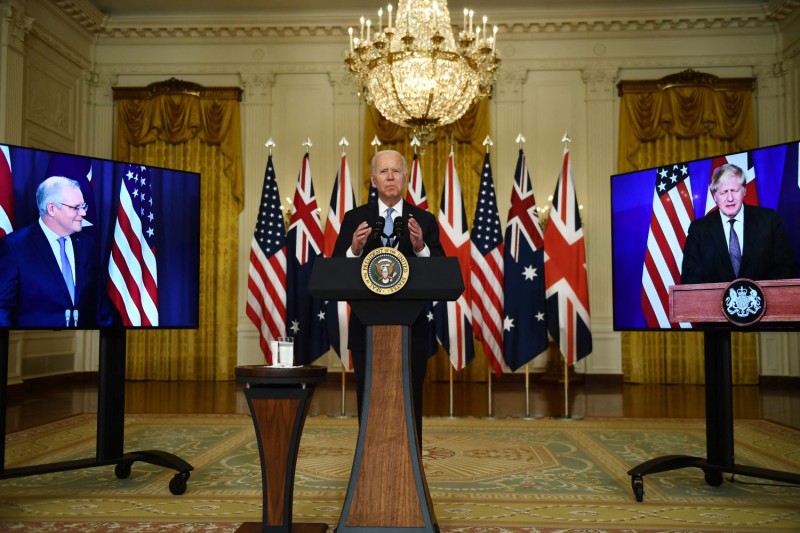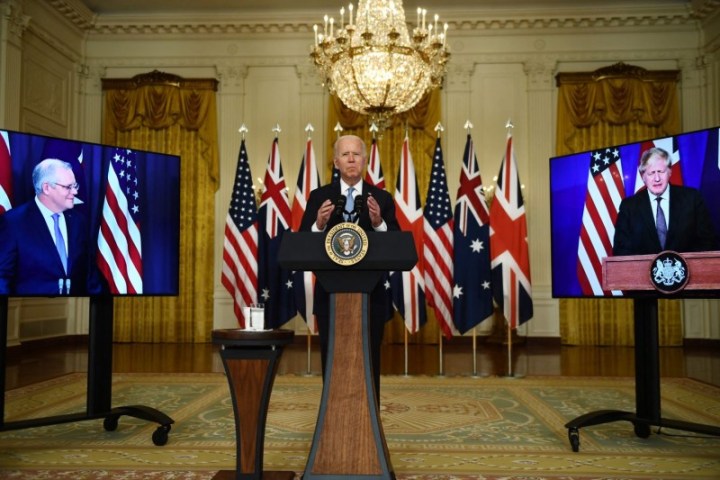By C. Raja Mohan (17 September 2021) – For India, the formation of the new Indo-Pacific coalition AUKUS—among Australia, the United Kingdom, and the United States—is welcome for a number of reasons. The objective of the coalition is to help Australia build a fleet of nuclear-powered submarines and deepen security cooperation in other areas, such as defense-related artificial intelligence and quantum computing, cyberwarfare, and underwater technologies.
From New Delhi’s perspective, the new coalition signals a strong political resolve in Washington to confront the growing security challenges from Beijing. In ending the long-standing taboo on transferring military nuclear propulsion technology even to its allies, the United States is also acknowledging that deterring China requires outside-the-box thinking.
Until now, the United States has shared the technology of military nuclear propulsion—used to power submarines with unparalleled stealth, speed, range, and endurance—only with the United Kingdom. By drawing London into the new trilateral coalition with Canberra, Washington is also ensuring a long-term role for its traditional European ally in stabilizing the Indo-Pacific.
Realists in New Delhi will recall how the decision by the George W. Bush administration to end India’s international nuclear isolation helped transform the ties between New Delhi and Washington. The historic civil nuclear initiative—implemented in the face of relentless opposition from U.S. and global non-proliferation bureaucracies—helped harmonize the two countries’ strategic interests. It also paved the way for India’s participation in the Quadrilateral Security Dialogue, or Quad, with Australia, Japan, and the United States. The new Australian-U.K.-U.S. coalition—already known by the acronym AUKUS—is among treaty allies, but also aims at leveraging nuclear cooperation to facilitate strategic outcomes in the Indo-Pacific: In this case, to significantly enhance Australia’s military capabilities and bind it in a long-term relationship to Britain and the United States.
It will be a while—perhaps late in the next decade— before Australia’s nuclear-powered submarines start prowling the Indo-Pacific. But it sets the stage for a more vigorous security engagement among three important strategic partners of India and will contribute to New Delhi’s own quest for a stable balance of power in the Indo-Pacific.
U.S. President Joe Biden, Australian Prime Minister Scott Morrison, and British Prime Minister Boris Johnson have justified the new nuclear coalition in the name of strengthening deterrence against China. Given India’s own mounting security problems with China, all actions designed to deter China, with or without Indian participation, are of strategic benefit to New Delhi.
Because India is increasingly preoccupied with overland threats from China, it needs enduring partnerships to protect its maritime flank. Although India’s naval capabilities are significant, the scale and scope of the threat presented by the Chinese People’s Liberation Army Navy have led India to focus on a wide range of maritime coalitions, including the Quad as well as separate relationships involving Australia, Japan, Indonesia, and France.
To be sure, there is a downside to Australia’s decision to build a fleet of nuclear-powered attack submarines with technology from the United States: the cancellation of Canberra’s earlier $65 billion deal to produce conventionally powered submarines with Paris.
France has been actively engaged in the Indo-Pacific, helping mobilize skeptical Europeans to focus on security challenges in the Far East and promoting a regional trilateral coalition with Australia and India. France, unsurprisingly, sees the Australian decision as a betrayal. Some Australian scholars see the need for a major gesture from Canberra to Paris. New Delhi should be eager to contribute.
India’s strategic partnership with France, which has rapidly grown in recent years, is rooted in the countries’ shared objectives in the Indo-Pacific, where Paris has territories and a naval presence. Having France as a maritime partner expands India’s Indo-Pacific reach and impact. India, therefore, has strong incentives to keep France in the Indo-Pacific and could hopefully find ways to strengthen its maritime security cooperation with France. One way of doing it is to pick France as its partner for the procurement of new submarines.
Some in the Indian leadership might see AUKUS weakening the Quad by leaving India and Japan out. But India is already a nuclear weapon power and has a nuclear submarine program of its own. Japan’s aversion to the military use of nuclear technology is too strong for Tokyo to be part of AUKUS. From New Delhi’s perspective, it makes sense to build overlapping mini-lateral coalitions among willing Indo-Pacific partners rather than a single NATO-like alliance that few in the region would like to see.
New Delhi also likes that the new initiative will bind Australia and Britain to a longer-term strategic relationship with the United States in the Indo-Pacific. Some would see AUKUS as a restoration of the Anglosphere in the east; Beijing’s propagandists will surely jump on this angle. They’d be wrong. New Zealand has long had a nuclear allergy of its own, does not share the U.S. perception of the Chinese threat, and has no desire to be part of AUKUS.
A major achievement of AUKUS lies in preventing further defections from the Anglosphere. Like New Zealand today, Australia and Britain until recently underestimated the threat from China and were bullish about economic engagement. It might be recalled that the first effort to build the Quad in the mid-2000s ran into serious opposition from Australia. Britain, under the premiership of David Cameron, likewise seemed eager to embrace China and reluctant to face up to the China challenge, when London proclaimed a golden era in British-Chinese relations.
The incentives for Australia’s decision to upgrade to nuclear-powered submarines from conventionally powered ones are also in play for India. As New Delhi confronts the rapid modernization of the Chinese navy and its growing presence in the Indian Ocean, its naval planners are also actively considering the shift to nuclear-powered attack submarines.
New Delhi’s plans for nuclear attack submarines are about coping with China’s ever-growing naval power projection into the Indian Ocean. This is different from India’s parallel program to build indigenous nuclear-powered ballistic missile submarines to obtain a secure second-strike capability, a key element of assured deterrence against its nuclear-armed adversaries, China and Pakistan. India has in the past operated two nuclear attack submarines, both named the INS Chakra. They were leased from Russia in 1988 and 2012; New Delhi also signed a deal with Moscow in 2019 for the lease of a third attack submarine.
But as it plans to build its own nuclear attack submarines, New Delhi is looking at other partners. Unlike in the past, when the focus was solely on Russia, India is said to be exploring potential partnerships with France and the United States. Despite much media speculation, there is no official confirmation from any of the countries.
Unlike the United States, which has been reluctant to share nuclear submarine technologies, France has an agreement to help Brazil build a nuclear-powered submarine. Hopes for an Indo-French agreement on nuclear attack submarines will surely rise now that AUKUS has been formed. For Paris, such an agreement would be a way of retaining its role as a major actor in the Indo-Pacific (and compensate for the painful loss of the Australian contract). For New Delhi, it would be a means to develop nuclear-powered submarines and reduce dependence on Moscow.
Finally, AUKUS marks an important shift in Asian security politics. Ever since the Treaty on the Non-Proliferation of Nuclear Weapons came into force in 1970, the regional nuclear order has been premised on U.S. allies abstaining from independent nuclear arsenals and relying on the U.S. nuclear umbrella instead. But as China’s military capabilities multiply—and questions about the credibility of the U.S. nuclear umbrella emerge—there has been renewed debate in Asia about nuclear weapons options. Sharing British and U.S. technology for nuclear-powered submarines with close Asian allies is a substantial strengthening of conventional deterrence, offering a third way between a fraying protective umbrella and proliferation of nuclear weapons.


